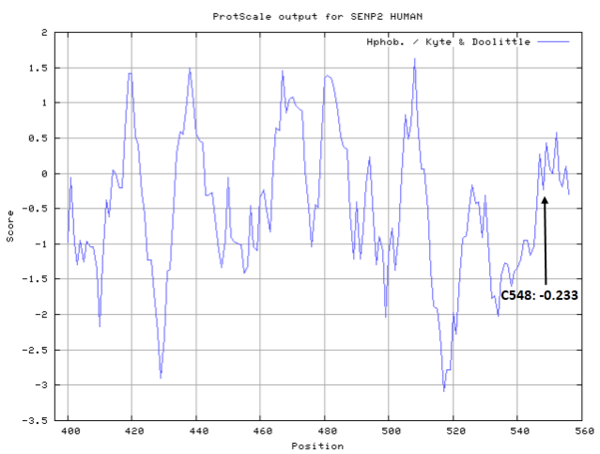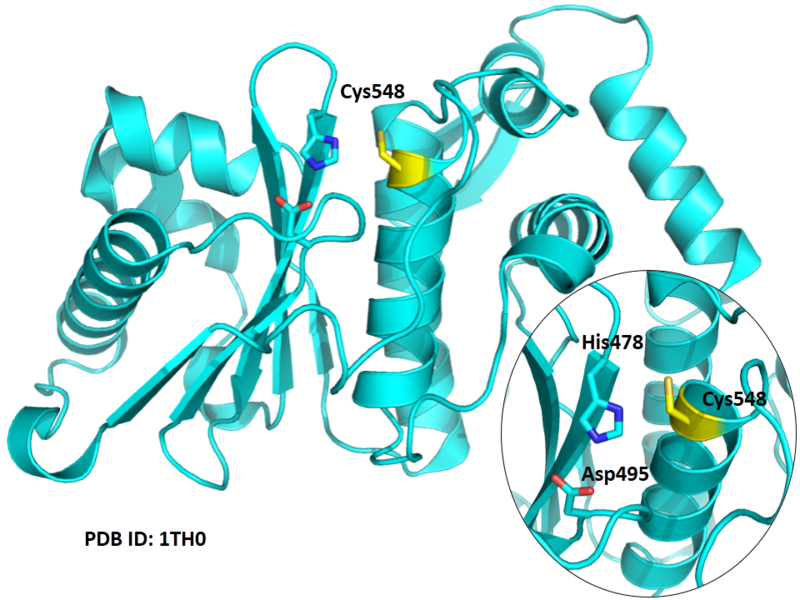Sentrin-specific protease 2
| Basic Information | |
|---|---|
| Short Name | SENP2 |
| UNP ID | Q9HC62 |
| Organism | Homo sapiens |
| Cys Site | Cys548 |
| Family/Domain | Peptidase C48 family |
| Known Ligand | Ligand list |
| Function Type | Protease |
Summary
Protein Function
Sentrin-specific protease 2 (SENP2) is one of a group of enzymes that process newly synthesized SUMO1 into the conjugatable form and catalyze the deconjugation of SUMO1-containing species. SUMO1 is a small ubiquitin-like protein that can be covalently conjugated to other proteins. (From Wikipedia)
Protease that catalyzes two essential functions in the SUMO pathway: processing of full-length SUMO1, SUMO2 and SUMO3 to their mature forms and deconjugation of SUMO1, SUMO2 and SUMO3 from targeted proteins. May down-regulate CTNNB1 levels and thereby modulate the Wnt pathway. Deconjugates SUMO2 from MTA1. (From Uniprot)
Cys Function & Property
Cys548 is one of the active sites of SENP1.
- Hydrophobic property:
- SASA:
- Cys548: 2.987 A^2
Protein Sequence
MYRWLVRILG TIFRFCDRSV PPARALLKRR RSDSTLFSTV DTDEIPAKRP
RLDCFIHQVK NSLYNAASLF GFPFQLTTKP MVTSACNGTR NVAPSGEVFS
NSSSCELTGS GSWNNMLKLG NKSPNGISDY PKIRVTVTRD QPRRVLPSFG
FTLNSEGCNR RPGGRRHSKG NPESSLMWKP QEQAVTEMIS EESGKGLRRP
HCTVEEGVQK EEREKYRKLL ERLKESGHGN SVCPVTSNYH SSQRSQMDTL
KTKGWGEEQN HGVKTTQFVP KQYRLVETRG PLCSLRSEKR CSKGKITDTE
TMVGIRFENE SRRGYQLEPD LSEEVSARLR LGSGSNGLLR RKVSIIETKE
KNCSGKERDR RTDDLLELTE DMEKEISNAL GHGPQDEILS SAFKLRITRG
DIQTLKNYHW LNDEVINFYM NLLVERNKKQ GYPALHVFST FFYPKLKSGG
YQAVKRWTKG VNLFEQEIIL VPIHRKVHWS LVVIDLRKKC LKYLDSMGQK
GHRICEILLQ YLQDESKTKR NSDLNLLEWT HHSMKPHEIP QQLNGSDCGM
FTCKYADYIS RDKPITFTQH QMPLFRKKMV WEILHQQLL
Structural Information
- Known structure with covalent ligand:
- Unknown
- Protein structure:
Related Pathway
Experimental Evidence
- Molecular Docking, Homologous Analysis of Sequence
Reference
- Ponder E L, Albrow V E, Leader B A, et al. Functional characterization of a SUMO deconjugating protease of Plasmodium falciparum using newly identified small molecule inhibitors[J]. Chemistry & biology, 2011, 18(6): 711-721. 21700207

